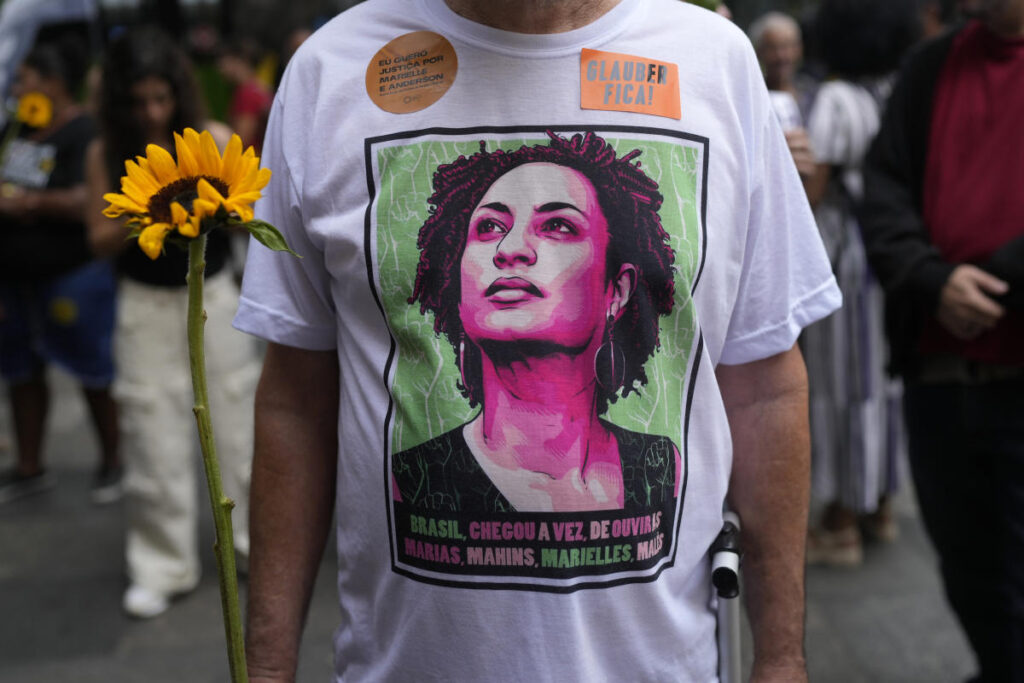On Thursday, a Rio de Janeiro judge issued lengthy prison sentences to two former police officers, Ronnie Lessa and Élcio de Queiroz, convicted of murdering city councilwoman Marielle Franco in 2018. Franco, a prominent figure in Brazil’s political left and advocate for human rights, was shot in a drive-by incident alongside her driver, Anderson Gomes. Lessa received a nearly 79-year sentence, while de Queiroz was sentenced to almost 60 years. The jury concluded that Lessa pulled the trigger and de Queiroz acted as the getaway driver. Their guilty pleas in a previous bargain contributed to the ongoing search for justice surrounding Franco’s assassination, a crime that many consider an affront to democracy.
Franco’s murder sparked national outrage, amplifying arguments around political violence and the necessity for accountability in Brazil. The prosecution initially sought the maximum sentence of 84 years for each defendant due to the severity of the charges, which included double homicide and conspiracy. Upon the announcement of their sentences, emotional reactions filled the courtroom; applause broke out as family members, including Franco’s sister, Anielle Franco, reacted with tears and embraces. As Brazil’s minister for racial equality, Anielle represents the ongoing struggle for social justice and acknowledgment of her sister’s legacy. Despite the light sentencing compared to international standards—where no life imprisonment exists in Brazil—the families found some solace in the rulings and were relieved to see at least some degree of accountability.
With the conclusion of this trial, attention now shifts to those accused of orchestrating Franco’s assassination. Two brothers allegedly linked to organized crime are facing allegations, with connections to militia groups operating in Rio. Guilhermo Catramby, a Federal Police detective, emphasized the political motivations behind the assassination, particularly Franco’s advocacy for land rights, which threatened militia interests in the region. As the case gathers momentum, the two brothers, Chiquinho and Domingos Brazão, have denied their involvement in Franco’s death and have yet to stand trial amidst continued investigations.
Marielle Franco emerged as a symbol of resistance within Rio’s favelas, fighting battles against police violence, defending women’s rights, and advocating for equitable housing. She was known for championing the rights of marginalized communities and representing the voices often silenced within Brazilian society. Testimonies presented during the trial unveiled personal narratives about Franco’s final moments and her impactful work. Her partner, Mônica Benício, conveyed a deep sense of loss, noting that the murder ripped away their plans for a shared future, forever altering the lives of Franco’s loved ones.
The trial has been closely followed, with the new federal government, under President Luiz Inácio Lula da Silva, reigniting efforts to uncover the truth behind Franco’s assassination. The eventual convictions are viewed as merely a preliminary step in a wider journey toward justice. Families of the victims have emphasized the need to ensure that those who financed the crime are also held accountable. Franco’s daughter, Luyara, poignantly remarked on the historical significance of the trial’s outcome, stressing the ongoing fight for justice and her unresolved pain over her mother’s loss.
As societal calls for justice continue to gain momentum, the commitment to uncovering the broader network responsible for Franco’s murder remains paramount. The current sentencing provides a glimmer of hope for justice in a nation where political violence has plagued its democratic fabric, but significant work remains. The families involved are determined to see the case through, holding strong to the belief that true justice will be achieved not only for Franco and Gomes but also for a society yearning for accountability against political crimes. Their fight embodies a collective demand for change in Brazil, encouraging future generations to challenge injustices and advocate for a more democratic society.

